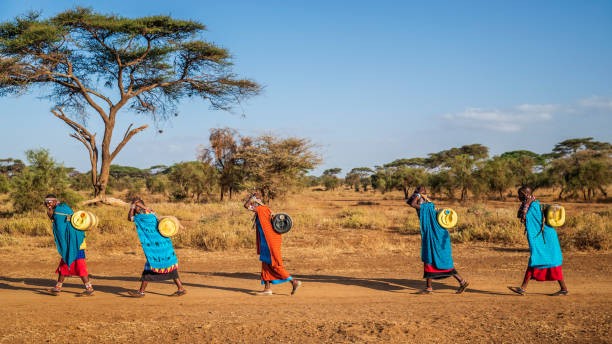Africa’s Route to Climate Adaptation
Climate change threatens to push millions of Africans into dire Poverty by 2030 and unravel hard earned development gains. Since 1970, Africa has experienced more than 2000 natural disasters , with just under half taking place in the last decade. These have resulted in repetitive food and water insecurity in the marginalized communities , yet these are the minimum basic needs for all humanity .

Unfortunately, the most depressing part is that most individuals in the communities which have been devastated by climate disasters have no knowledge whatsoever in regards to climate change. They are not aware that these calamities are due to greenhouse emissions. They can neither explain nor protect themselves from the causes of these experiences. Statistics already show approximately 460 million people in Africa have been affected by dramatic climate events , with more than 880,000 casualties.African Climate activists cannot be silent anymore, in one accord we will stand and speak for our people, and the future generations to come.
Our strong belief is that African Nations and communities should urgently scale up adaptation and resilience. These concerns should not only be discussed in the European Parliament but also in African parliaments. Our leaders need to be at the frontline to advocate for finance for climate by both Public and private investors. They need to integrate climate disaster risk management into building resilience in the most affected communities.
The adaptation finance processes should focus on disaster risk financing and insurance programs . These focus on strengthening resilience by identifying climate risks early to combat them, enhancing payments of affected people during adverse events. This helps them not to slip into poverty. We are certain a secured contingent funding alleviates the disaster shocks amongst the poorest.
African governments need to incorporate climate action within national development priorities. We should incorporate climate targets, strategies and indicators into our national development plans. Obviously, we are aware of the considerable coherence of climate disasters and poverty. If our leaders are empowered and taught to look at climate mitigation in terms of socio-economic development of their people, we are convinced they will dedicate resources to coordinate climate finance; promote transparency, accountability and efficient allocation of funds.
The Involvement of brave leaders in government brings about effective sustainable climate action programs and policies like in the case of Alexandria Ocasio Cortez of New York who is one of the bold leaders that have pushed for the Green New Deal programs in U.S.A ;a congressional resolution that has proposed systemic change in all communities , focusing on the most marginalized( people of color, immigrants). The proposal includes:
- 100% transition to clean energy like solar, wind and geothermal power.
- Creation of jobs and economic growth through high paying jobs in the renewable energy sector, construction and manufacturing sectors, focusing on marginalized communities
- Sustainable agriculture by promoting sustainable agriculture practices which reduce greenhouse gas emissions and improve soil health.
- Investment in research and development of new technologies that can avert climate change
These climate movement programs which run on a large scale and are mainly encompassing the global north, should equally be thriving in Africa, since we are the ones witnessing the acute climate adversities. The question is, how will they even begin when there is a huge knowledge gap concerning the climate crisis, not exempting our policy makers? When the people at community level have no capacity to even debate or reason with institutions meant to protect them.
In conclusion, If Climate adaptation and Finance is to advance in Africa, there must be commitment from leadership at all levels , right from local bodies to international ones. We are aware as climate activists that although at COP27 pledges of over $230million were made toward the adaptation fund, more annual financing needs of $52.7 billion are needed by 2030. Therefore, the importance of climate adaptation finance and resilience should be known to all the African people with focus on equitable and sustainable development in Africa.
